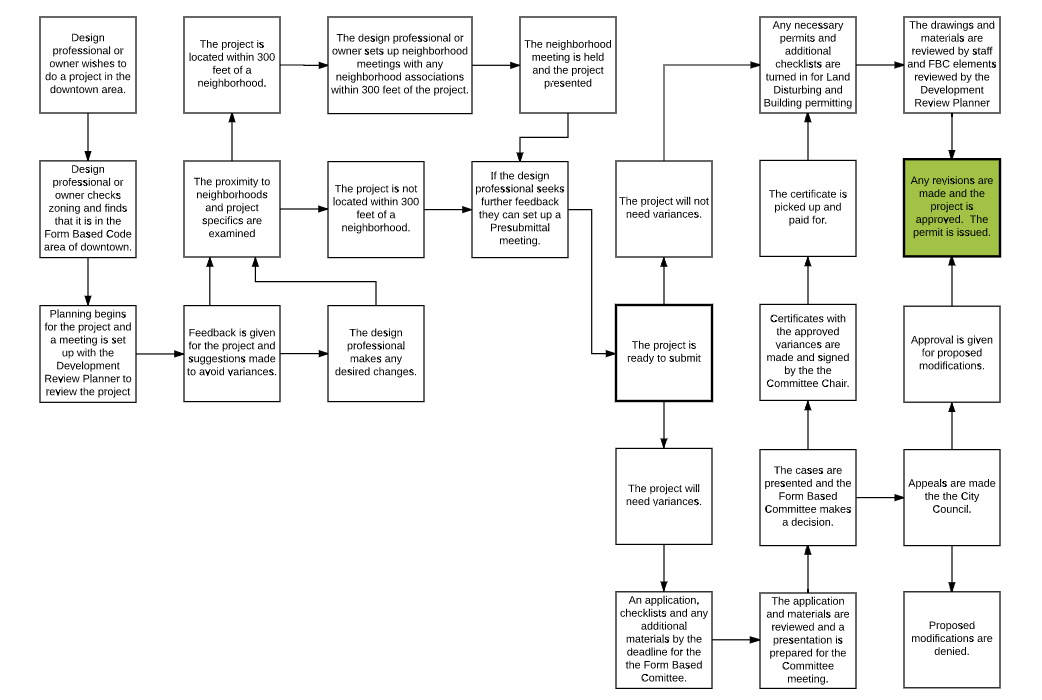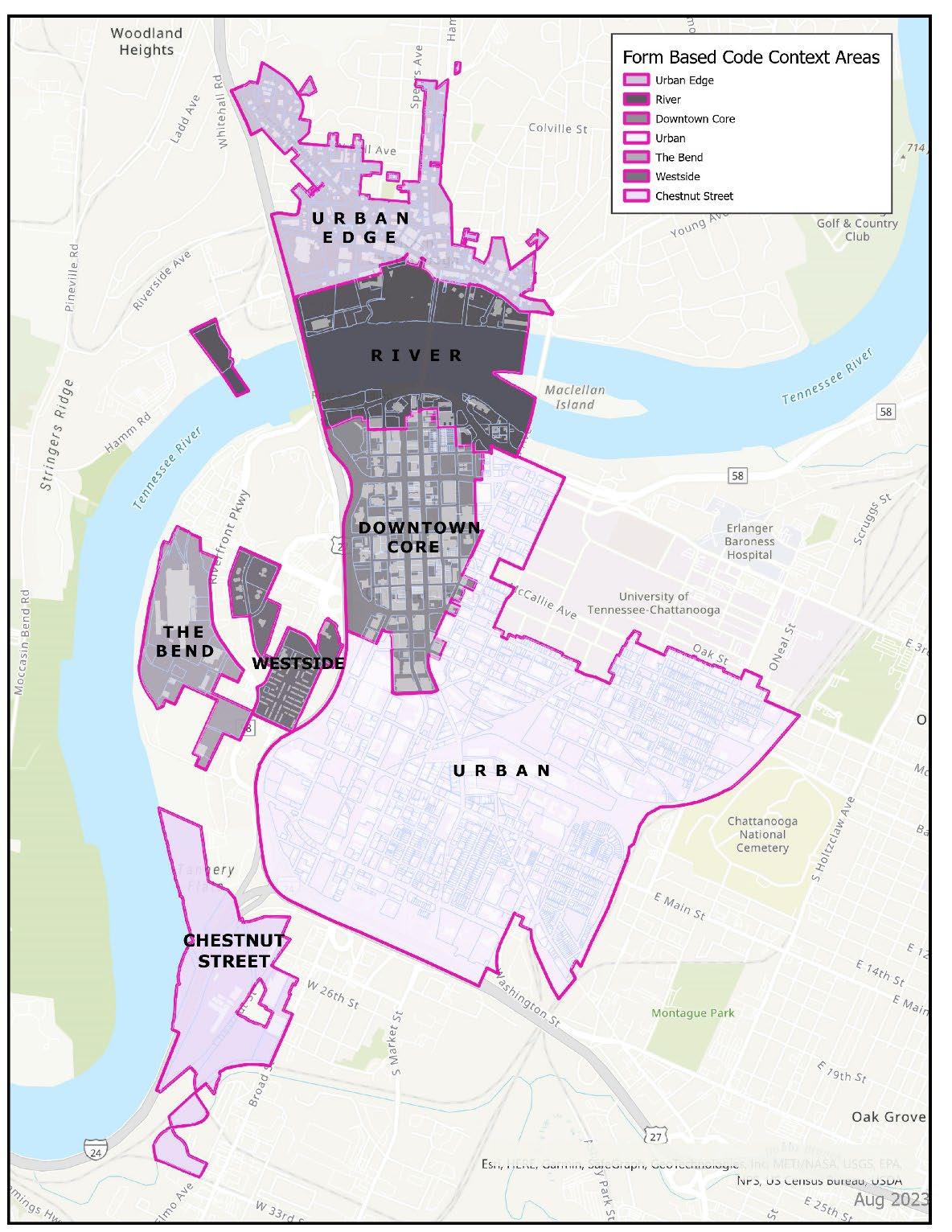Types of Zoning in Chattanooga
There are two types of zoning found in the city of Chattanooga. one is the Euclidean zoning that is found in the majority of the city limits. The other zoning type is the Form-Based Code (FBC) "downtown code" zoning. The FBC zones were developed with regulations and standards framed to promote urban development form that aligns with the vision and policies set forth by the Downtown, ML King, Southside, and North Shore plans. These plans define a vision for growth that is urban, mixed-use, walkable, neighborhood-friendly, and contribute to a high-quality public realm.
For more information pertaining to the Euclidean zoning found in the remainder of the city limits please go to our Zoning & Maps page.
Important Dates
The FBC zoning was adopted on June 21, 2016, and became effective on July 5, 2016. The final cut-off date for old zoning submissions was December 5, 2016. The FBC zoning has been amended three times: May 1, 2018, December 17, 2019, and September 15, 2020.
Form-Based Code Zoning Documents
The Form-Based Code document includes updates for all the ordinances listed below.
- Ordinance No. 13520 - Text amendments and addition of new Context Areas (Westside - Chestnut Street) and Associated Zones
- Ordinance No. 13592 - Text amendments resulting from the 2019/2020 annual review
- Ordinance No. 13685 - Text amendment clarifying the signs and projecting signs section
- Ordinance No. 13760 - Text amendment to add a process for the adoption of new zones
- Ordinance No. 13761 - Text addition of the new Bend River Zone (B-R-12)
- Ordinance No. 13762 - Text amendment to remove and alter sections of the Zones in the Bend context area
Minutes & Agenda
Applications
Permit Submittal in the FBC Context Areas
When submitting an application for a Land Disturbance and a Building permit, the following documents may be required.
- Plan Review Checklist
- Submission Checklist
- Site Plan
- Building Elevations
- Required Specifications: Window, Lighting, Sign, or Planting (when applicable)
- Stamped Site Survey
Sign-in Sheet from the Neighborhood meeting (if it is required)
FBC Modification Applications
All Land Development Office applications are now located online, in the Viewpoint Cloud portal. Create a login, locate the modification application in the Zoning & Signs folder, and complete the modification application.
Process Details
Form-Based Code Committee - Role and Responsibilities
The Form-Based Code Committee is responsible for reviewing major modification requests that do not qualify for staff approval and to review appeals of staff decisions/ interpretations.
The standards established in this Downtown Code are intended to achieve the following principles:
- Maintain a safe, walkable, and attractive urban environment along the street;
- Maximize opportunities for redevelopment and investment in the Downtown Core;
- Provide a diversity of housing options;
- Promote development that will support transit and commercial services the community desires;
- Protect established single-family residential areas from incompatible development;
- Protect the integrity of established Historic Districts and significant historic/civic landmarks;
- Balance development opportunity and conservation along the riverfront by promoting development scale/form that maintains public accessibility to the river and considers public/private benefits of scenic views along the river;
- Consider impacts of topography, both in terms of the reasonableness of the standard when applied to a particular site and the potential impacts on adjoining properties;
- Increase the tree canopy; and
- Support adopted plan policies and recommendations.
The Form-Based Code Committee members must have a professional background/ or personal experience working, building, designing, or living in urban places. The committee will be composed of nine (9) rotating members set forth as follows: Commission Membership:
- 3 Architect/Urban Designer/Landscape Architect.
- 3 Developer/Realtor/Banker/Civil Engineer/ Contractor.
- 3 Property Owner/Resident/Business Owner.
Each City Council representative whose district is located in the Form-Based Code Area must submit up to three (3) candidates that meet the qualifications noted above for a vacant position on the Form-Based Code Committee. The Mayor will select the candidate or request additional names from the affected Council Member before submitting the selection to City Council for final approval.
This process chart does NOT cover every situation, so please call staff with specific process or procedure questions.
Image

Form-Based Code Inquiries
Please direct questions regarding the Form Based Code to fbczoning@chattanooga.gov.
FBC Context Areas
- Northshore
- Riverfront
- City Center
- Martin Luther King
- Southside
- The Bend
- Westside
- Chestnut Street
Image

Researching Property Zoning
To determine your property's zoning, follow the instructions on navigating Chattanooga GIS mapping.
Rezoning Property
The Land Development Office (LDO) does not handle property rezoning. To rezone your property, please contact the Regional Planning Agency (RPA).
FBC Project Consultation Meeting
Before submitting an application for plan review and permitting, an applicant is required to schedule a project consultation meeting with the FBC Development Review Planner to discuss the review procedures and applicable standards for approval. This meeting is not intended as an approval meeting, but to provide the applicant with an overview of the application requirements and to identify issues or opportunities relating to compliance with the requirements of this Downtown Code. Please contact the FBC Planner directly to schedule this meeting.
LDO Pre Submittal Meetings
After the FBC project consultation meeting, set up an LDO pre-submittal meeting.
- Email: LDOPermits@chattanooga.gov
- Phone: (423) 643.5884
Neighborhood Input Meeting
Before submitting an application for Plan Review, an applicant must meet with the Neighborhood Association (listed with the Neighborhood Services Department), except that the following are exempt:
a. Residential development with less than 5 units;
b. Nonresidential development less than 4,000 square feet; or
c. Any development activity that is not within an existing neighborhood association boundary or within 300 feet of the neighborhood association boundary; or
d. Interior build-outs with no change to the exterior facade, windows, or fenestration.
Go to Neighborhood Associations for the full directory of neighborhood associations. Check through the Neighborhood Association Directory for the current full list of neighborhood associations within the area. The Department of Neighborhood Services and Development maintains the directory of registered neighborhood associations.
Neighborhood Association FBC Informational Meeting Guide
If a Neighborhood Association Input Meeting is required, find meeting procedures and what to bring.